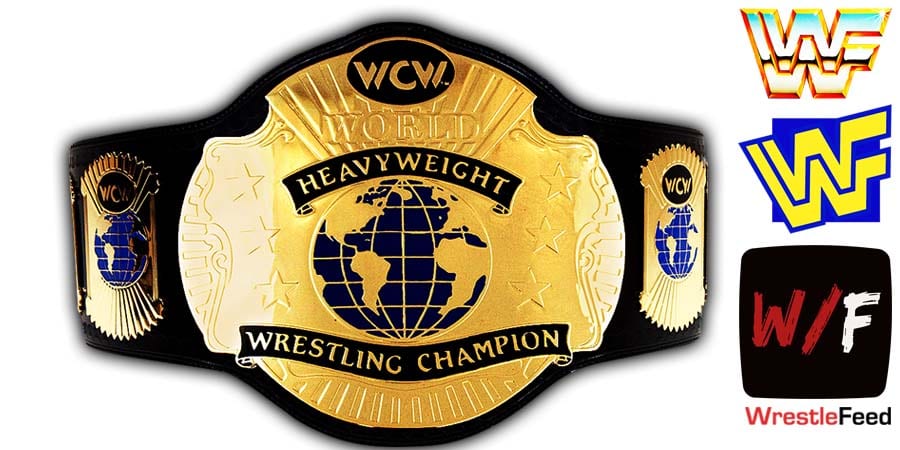On the latest edition of his weekly ‘My World’ podcast, WWE Hall of Famer Jeff Jarrett spoke about the WCW Halloween Havoc 2000 pay-per-view and things that surrounded the event.
Double J also gave us an inside view behind the scenes, when he described how the match making and the creative process took place at that time, especially with Vince Russo in charge, who is widely considered one of the most controversial people in pro wrestling history.
Here’s what Jarrett had to say:
“These episodes Conrad, just because there was so much going on — and for years, this has been dissected and talked about and rehashed. Even our network here, the different viewpoints, it’s been talked about, so sometimes my timelines get messed up. But Russo got the concussion from Goldberg running him through the fence and Long Island, correct? Yeah, but that’s why. But anyway, him getting a concussion, as a performer, on the one hand, you go, ‘Why should anybody be surprised?’ Vince is not a wrestler.
I’m not saying that, Vince doesn’t mind taking an a$$ whooping but you’re kind of putting yourself out on the buffet. I’m not saying to get hurt, but accidents can happen. And it is a very physical type of deal. I don’t wanna say play Murphy’s Law, but it shouldn’t have come as too big of a surprise that he got hurt. And then you have to kind of extrapolate out saying, ‘Okay, let’s think about this. If you’re the lead writer or head of creative and then you’re putting yourself in harm’s way, who’s really at fault here?’.”
Jarrett then talked about his Halloween Havoc 2000 match against Sting, where Vince Russo (who is also a former WCW World Heavyweight Champion) explained to him why wins and losses don’t matter:
“Overbooked. If this is an angle and a build that you spread out over four to six weeks. That the first Stings were like week one, and the second Stings were week two, it’s kind of, you could maybe do an episodic storyline. But you so eloquently do, like you always do, is when you actually got to go, ‘Ding ding, here’s the match, pinfall, submission, countout, whatever it is.’ Then that’s where, and you know, me and Vince and Dutch, we would always kind of get into these healthy debates that, ‘Look, it’s not necessarily the idea’s completely convoluted. But it doesn’t work within the context of a match.’
And he would say, ‘Bro, I’m not a wrestler.’ And I’d say, ‘You’re right. So, let’s not put that in a match context. Let’s put that in storylines, and spice ups, and builds, and angles and all that. But when you get to a match, it all has to pay off ultimately in a one, two, three. And then you get into, ‘Well, that’s not entertaining.’ ‘Well, yes, it is if you build intrigue and make the win and the losses‘ ‘Oh, wins and losses don’t mean anything’.
It’s that subjective debate that has gone on since the beginning of time in wrestling. But that’s — to me, you kind of nailed it. And when you sit back and look at this as a contest, look, scripted, whatever you want to say. But in the context of sports entertainment/professional wrestling, when you’re trying to put on a match you have to have some wrestling logic. And Dutch would lean into wrestling logic. ‘Okay, how are we going to get to that one, two, three and make it mean something?’ You have to follow it up and make it mean something.
Anybody can get to a one, two, three or a count out or DQ or whatever it may be. How do you make it mean something where your audience emotionally connects? This was just too much. But to add insult to injury, when you have five matches behind it that were overbooked as well? It’s just, that the audience is just like, ‘Okay, I don’t like this. I’m voting on this. I don’t like this.’ I mean, comparatively speaking, two years before that probably sold out that arena. So still, better than what we’d been doing but business was down.
And nothing was changing to right the ship. This is just — God, and that’s the other thing, Conrad. When you say this is the worst pay-per-view of the year, it’s like saying for the WWE, ‘Hey, WrestleMania was their worst pay-per-view of the year out of the 12.’ That says a lot when Halloween Havoc, which was hypothetically the biggest show of the year for WCW. When that was, in one man’s opinion but I’m sure Keller and other folks might not have called it the worst of the year. But it was universally not praised. That’s just such a bad sign.”
After working for the World Wrestling Federation (1992-1999) in various positions and later being in charge of the TV program in Ted Turner’s World Championship Wrestling (1999-2000), Vince Russo was a writer and head of creative for most of his 2002-2011 TNA (Total Nonstop Action!) run behind the scenes.
WATCH: Torrie Wilson Reveals Her Buns In A Bikini (Part 3):

